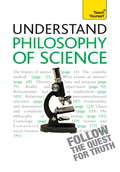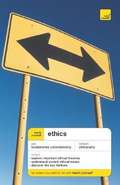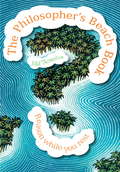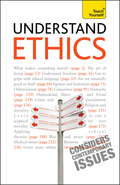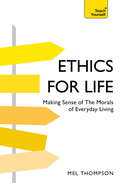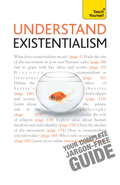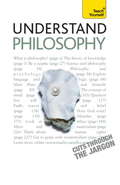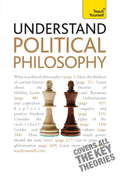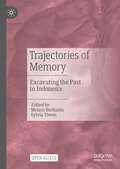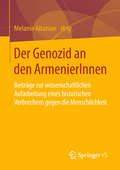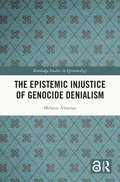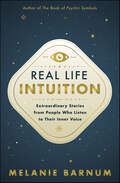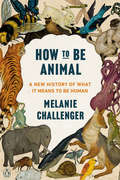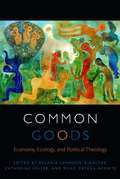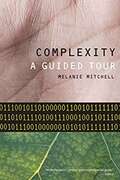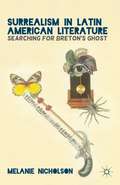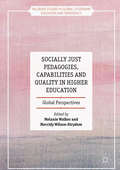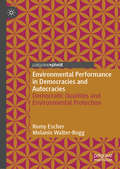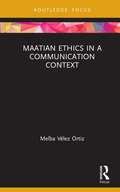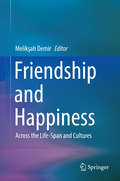- Table View
- List View
Philosophy of Science: Teach Yourself
by Mel ThompsonA modern understanding of the world is unthinkable without science, but what exactly is it? What does it mean to say that something is 'scientific'? How are its results justified? From the genetic basis of life, to the structures of the universe and the atom, TEACH YOURSELF PHILOSOPHY OF SCIENCE explores how the key ideas that shape our world have been developed.- Investigate the history of science.- Examine scientific method.- Discover key philosophers and scientists.- Explore the impact of science on Western thought.
Philosophy of Science: Teach Yourself
by Mel ThompsonA modern understanding of the world is unthinkable without science, but what exactly is it? What does it mean to say that something is 'scientific'? How are its results justified? From the genetic basis of life, to the structures of the universe and the atom, TEACH YOURSELF PHILOSOPHY OF SCIENCE explores how the key ideas that shape our world have been developed.- Investigate the history of science.- Examine scientific method.- Discover key philosophers and scientists.- Explore the impact of science on Western thought.
Teach Yourself Ethics
by Mel ThompsonDo you need an introduction to the main ethical theories? Would you like to understand current ethical issues? Do you want to develop your own moral awareness? From altruism to utilitarianism and Nietzsche to Marx, Ethics is a jargon-free introduction to key ethical theories and thinkers. It covers both the contribution of the major world religions to this fascinating subject as well as clear, thought-provoking discussions of applied ethics. The contemporary examples and issues in this latest edition ensure that this book challenges and engages you. Why not try, Philosophy, Psychology, Globalization, Philosophy of Mind, or visit www.books.mcgraw-hill.com? Book jacket.
Teach Yourself Philosophy of Religion
by Mel ThompsonThe philosophy of religion examines the general ideas and principles upon which religion is based. It takes the beliefs that religious people hold to be true. The philosophy of religion is not just about logical arguments but about the meaning and significance religion has in people's lives, and what it is that leads some people to follow and others to reject a religion. The philosophy of religion takes religious beliefs and asks how they are to be understood, if they make sense, and if they fit with the rest of our knowledge of the universe.
The Philosophers Beach Book
by Mel ThompsonThe Philosopher's Beach Book invites you to relax and think; to wiggle your toes in the sand (literally or metaphorically) and reflect on the meaning of life. Have you ever stretched out on a holiday beach or taken a relaxed stroll in the evening, musing on your life 'back home' - your family, your work, your values - and wondered if it all makes sense? This book invites you to ask questions; to explore the assumptions of everyday life; to challenge your own values. You may go on holiday to see something new, but it also offers you a new perspective on the familiar. From the distance of your (literal or metaphorical) beach, now is the chance to give life a gentle, intellectual prod.
The Philosophers Beach Book
by Mel ThompsonThe Philosopher's Beach Book invites you to relax and think; to wiggle your toes in the sand (literally or metaphorically) and reflect on the meaning of life. Have you ever stretched out on a holiday beach or taken a relaxed stroll in the evening, musing on your life 'back home' - your family, your work, your values - and wondered if it all makes sense? This book invites you to ask questions; to explore the assumptions of everyday life; to challenge your own values. You may go on holiday to see something new, but it also offers you a new perspective on the familiar. From the distance of your (literal or metaphorical) beach, now is the chance to give life a gentle, intellectual prod.
Understand Ethics: Making Sense of the Morals of Everyday Living
by Mel ThompsonWhether you're a student studying philosophy at any level, or simply want to gain a deeper understanding of this fascinating subject, Understand Ethics is an accessible introduction to all the key theories and thinkers. Fully updated, this latest edition includes contemporary examples and discussion of current debates including terrorism, genetics and the media, helping you to grasp how ethics applies to life today.NOT GOT MUCH TIME?One, five and ten-minute introductions to key principles to get you started.AUTHOR INSIGHTSLots of instant help with common problems and quick tips for success, based on the author's many years of experience.TEST YOURSELFTests in the book and online to keep track of your progress.EXTEND YOUR KNOWLEDGEExtra online articles at www.teachyourself.com to give you a richer understanding of psychology.FIVE THINGS TO REMEMBERQuick refreshers to help you remember the key facts.TRY THISInnovative exercises illustrate what you've learnt and how to use it.
Understand Ethics: Making Sense of the Morals of Everyday Living (Teach Yourself General Ser.)
by Mel ThompsonWe all face questions on an almost daily basis related to truth and post-truth, particularly in the political sphere, terrorism, globalization, immigration and asylum, social responsibility, media and social-media ethics, and gender and LGBT issues. So how do you navigate this minefield? Ethics for Life is an accessible introduction to all the key theories and thinkers. It shows the relevance of ethical ideas and theories to everyday life, emphasizing the way our view of ourselves and the societies we live in is shaped by our moral values and the arguments they are based on.With contemporary examples and discussion of current debates including terrorism, genetics and the media, Ethics for Life will help you grasp how ethics applies to life today.
Understand Existentialism: Teach Yourself (Teach Yourself Educational)
by Mel Thompson Nigel RodgersUnderstand Existentialism breaks down a complex mode of thought into more manageable sections, enabling you to get to grips with the key concepts within the movement. Chart the origins and development of existentialism in a variety of disciplines and learn about significant thinkers from Sartre and De Beauvoir to Beckett and Camus. Whether you are a newcomer or more experienced student, this book will enhance your understanding of a brand of philosophy designed to give meaning and direction amongst the uncertainties of modern life.NOT GOT MUCH TIME?One, five and ten-minute introductions to key principles to get you started.AUTHOR INSIGHTSLots of instant help with common problems and quick tips for success, based on the author's many years of experience.EXTEND YOUR KNOWLEDGEExtra online articles at www.teachyourself.com to give you a richer understanding.THINGS TO REMEMBERQuick refreshers to help you remember the key facts.TRY THISInnovative exercises illustrate what you've learnt and how to use it.and how to use it.
Understand Philosophy: Teach Yourself (Teach Yourself General Ser.)
by Mel ThompsonThis book is the essential introduction to the history of Western thought. Covering all the key thinkers, both ancient and modern, and all the major branches of philosophy, it will give you new insights about the world we live in. Packed full of examples and clear explanations, and with key terms defined and explained, it is ideal whether you are student looking for a quick refresher or just want to explore this fascinating topic out of personal interest.NOT GOT MUCH TIME?One, five and ten-minute introductions to key principles to get you started.AUTHOR INSIGHTSLots of instant help with common problems and quick tips for success, based on the author's many years of experience.TEST YOURSELFTests in the book and online to keep track of your progress.EXTEND YOUR KNOWLEDGEExtra online articles at www.teachyourself.com to give you a richer understanding of psychology.FIVE THINGS TO REMEMBERQuick refreshers to help you remember the key facts.TRY THISInnovative exercises illustrate what you've learnt and how to use it.
Understand Philosophy: Teach Yourself (Teach Yourself General)
by Mel ThompsonThis book is the essential introduction to the history of Western thought. Covering all the key thinkers, both ancient and modern, and all the major branches of philosophy, it will give you new insights about the world we live in. Packed full of examples and clear explanations, and with key terms defined and explained, it is ideal whether you are student looking for a quick refresher or just want to explore this fascinating topic out of personal interest. NOT GOT MUCH TIME? One, five and ten-minute introductions to key principles to get you started. AUTHOR INSIGHTS Lots of instant help with common problems and quick tips for success, based on the author's many years of experience. TEST YOURSELF Tests in the book and online to keep track of your progress. EXTEND YOUR KNOWLEDGE Extra online articles at www.teachyourself.com to give you a richer understanding of psychology. FIVE THINGS TO REMEMBER Quick refreshers to help you remember the key facts. TRY THIS Innovative exercises illustrate what you've learnt and how to use it.
Understand Political Philosophy: Teach Yourself (Teach Yourself General Ser.)
by Mel ThompsonUnderstand Political Philosophy is an in-depth guide to the philosophers and political ideas who have shaped our society. Quickly and easily get to grips with the key thinkers and theories, from Aristotle to Wollstonecraft, from capitalism to utilitarianism. With exploration of contemporary issues and current debates, this book will put political philosophy in the context of the world we live in today.NOT GOT MUCH TIME?One, five and ten-minute introductions to key principles to get you started.AUTHOR INSIGHTSLots of instant help with common problems and quick tips for success, based on the author's many years of experience.TEST YOURSELFTests in the book and online to keep track of your progress.EXTEND YOUR KNOWLEDGEExtra online articles at www.teachyourself.com to give you a richer understanding of psychology.FIVE THINGS TO REMEMBERQuick refreshers to help you remember the key facts.TRY THISInnovative exercises illustrate what you've learnt and how to use it.
Understand Political Philosophy: Teach Yourself (Teach Yourself General)
by Mel ThompsonUnderstand Political Philosophy is an in-depth guide to the philosophers and political ideas who have shaped our society. Quickly and easily get to grips with the key thinkers and theories, from Aristotle to Wollstonecraft, from capitalism to utilitarianism. With exploration of contemporary issues and current debates, this book will put political philosophy in the context of the world we live in today.NOT GOT MUCH TIME?One, five and ten-minute introductions to key principles to get you started.AUTHOR INSIGHTSLots of instant help with common problems and quick tips for success, based on the author's many years of experience.TEST YOURSELFTests in the book and online to keep track of your progress.EXTEND YOUR KNOWLEDGEExtra online articles at www.teachyourself.com to give you a richer understanding of psychology.FIVE THINGS TO REMEMBERQuick refreshers to help you remember the key facts.TRY THISInnovative exercises illustrate what you've learnt and how to use it.
Trajectories of Memory: Excavating the Past in Indonesia
by Melani Budianta Sylvia TiwonThis book is a collection of essays in Indonesian history and archaeology dealing with different and multiple trajectories, along four broad themes. The first part of the book covers competing or evolving representations of events, customs or traditions, and historical personae in Indonesian official and popular expression, as they are shaped by economic, political, and cultural forces. The second part deals with memories of war and peace, examining transnational conflict and collaboration, the role of political elites and state projects dealing with the aftermath of military aggression, while also focusing on the impact and responses of civilians. The third part focuses on how state and civil societies frame historical figures, in ways that transcend the dichotomy of heroes and victims. The fourth part of the book looks at the way Indonesian museums and museology serve as sites where new kinds of memory work occur, in a post-1998 era.The book is designed with the aim of clearing a space for a plurality of memory works. Discussions in this volume extend from Loloda island in Eastern Indonesia, to Sabang island at the north westernmost end of the archipelago, and to the cosmopolitan centers. Temporally, it covers the colonial, the post-independence and contemporary eras. By juxtaposing diverse works, the book offers a new vista of multiple trajectories of memory being traced out in and about Indonesia.This is an open access book.
Der Genozid an den ArmenierInnen: Beiträge zur wissenschaftlichen Aufarbeitung eines historischen Verbrechens gegen die Menschlichkeit
by Melanie AltanianDieser inter- und multidisziplinäre Band bietet einen Querschnitt durch die wissenschaftliche Auseinandersetzung mit dem über hundert Jahre zurückliegenden Armenier-Genozid, der bis heute von den türkischen Nachfolgeregierungen offiziell geleugnet wird. Beiträge aus unterschiedlichen Disziplinen weisen auf spezifische Probleme hin, die mit der Aufarbeitung dieses Genozids zusammenhängen: Beginnend mit einem (rechts-)historischen Teil über das Verbrechen sowie dessen zeitgenössische Bewertung, hin zu den direkten und indirekten psychologischen Folgen des Verbrechens bis heute, sowie moralphilosophische und rechtliche Fragestellungen in Bezug auf die Leugnung des Genozids.
The Epistemic Injustice of Genocide Denialism (Routledge Studies in Epistemology)
by Melanie AltanianThe injustice of genocide denial is commonly understood as a violation of the dignity of victims, survivors, and their descendants, and further described as an assault on truth and memory. This book rethinks the normative relationship between dignity, truth, and memory in relation to genocide denial by adopting the framework of epistemic injustice.This framework performs two functions. First, it introduces constructive normative vocabulary into genocide scholarship through which we can gain a better understanding of the normative impacts of genocide denial when it is institutionalized and systematic. Second, it develops and enriches current scholarship on epistemic injustice with a further, underexplored case study. Genocide denialism is relevant for political and social epistemology, as it presents a substantive epistemic practice that distorts normativity and social reality in ways that maintain domination. This generates pervasive ignorance that makes denial rather than recognition of genocide appear as the morally and epistemically right thing to do. By focusing on the prominent case of Turkey’s denialism of the Armenian genocide, the book shows the serious consequences of this kind of epistemic injustice for the victim group and society as a whole.The Epistemic Injustice of Genocide Denialism will appeal to students and scholars working in social, political, and applied epistemology, social and political philosophy, genocide studies, Armenian studies, and memory studies.The Open Access version of this book, available at www.taylorfrancis.com, has been made available under a Creative Commons Attribution-Non Commercial-No Derivatives (CC-BY-NC-ND) 4.0 license. Any third party material in this book is not included in the OA Creative Commons license, unless indicated otherwise in a credit line to the material. Please direct any permissions enquiries to the original rightsholder.Funded by: Swiss National Science Foundation
Real Life Intuition: Extraordinary Stories from People Who Listen to Their Inner Voice
by Melanie BarnumTrust Your Metaphysical Senses and Master Your IntuitionFeaturing empowering and sometimes surprising experiences from real people and exercises for developing your natural gifts, this book teaches you how to use intuition to get ahead in life. Discover inspiring stories from doctors, lawyers, musicians, therapists, and other professionals who tapped into their intuition and experienced a positive life shift. Through these vignettes you will gain a deeper understanding and working knowledge of your five clairs: clairsentience, claircognizance, clairvoyance, clairaudience, and clairalience. Melanie Barnum also reveals how to interpret dreams, intuitive flashes, and signs and synchronicities. With this book, you will tune in to the universal energy that connects us all and use it to help move toward greater success and joy.
How to Be Animal: A New History of What It Means to Be Human
by Melanie ChallengerWhat makes us human, and why are we so sure we're different from other animals?Humans are the most inquisitive, emotional, imaginative, aggressive, and baffling animals on the planet. But how well do we really know ourselves? How to Be Animal rewrites the remarkable human story and argues that at the heart of our psychology is a profound struggle with being animal.Most of our effects on the planet are the consequences of technological improvements and advances in our understanding of natural mechanisms. But why did this cognitive and technological edge come about in the first place and what kind of being has it made us? In How to Be Animal, Challenger brilliantly argues that this dizzying trajectory is the result of a singular characteristic of our species: the struggle with being an animal. Using a combination of memoir, historical texts, interweaving interviews and cultural and environmental history, How to Be Animal is lively and thought-provoking, bursting with ideas. This is a book for anyone who has ever contemplated what humans are and what makes our species so simultaneously brilliant and awful. Even more so, it is a book that asks tantalizing philosophical questions, such as whether and how human life matters. How to Be Animal is a tough-minded but ultimately sympathetic portrait of humanity. It exposes human beings as extraordinary animals defined by a profound struggle. In the third millennium, the way humans respond to being an animal among animals is the greatest and most inspiring challenge we face.
Common Goods: Economy, Ecology, and Political Theology (Transdisciplinary Theological Colloquia)
by Melanie Johnson-DeBaufre, Catherine Keller, and Elias Ortega-AponteIn the face of globalized ecological and economic crises, how do religion, the postsecular, and political theology reconfigure political theory and practice? As the planet warms and the chasm widens between the 1 percent and the global 99, what thinking may yet energize new alliances between religious and irreligious constituencies?This book brings together political theorists, philosophers, theologians, and scholars of religion to open discursive and material spaces in which to shape a vibrant planetary commons. Attentive to the universalizing tendencies of “the common,” the contributors seek to reappropriate the term in response to the corporate logic that asserts itself as a universal solvent. In the resulting conversation, the common returns as an interlinked manifold, under the ethos of its multitudes and the ecology of its multiplicity.Beginning from what William Connolly calls the palpable “fragility of things,” Common Goods assembles a transdisciplinary political theology of the Earth. With a nuance missing from both atheist and orthodox religious approaches, the contributors engage in a multivocal conversation about sovereignty, capital, ecology, and civil society. The result is an unprecedented thematic assemblage of cosmopolitics and religious diversity; of utopian space and the time of insurrection; of Christian socialism, radical democracy, and disability theory; of quantum entanglement and planetarity; of theology fleshly and political.
Complexity: A Guided Tour
by Melanie MitchellWhat enables individually simple insects like ants to act with such precision and purpose as a group? How do trillions of neurons produce something as extraordinarily complex as consciousness? In this remarkably clear and companionable book, leading complex systems scientist Melanie Mitchell provides an intimate tour of the sciences of complexity, a broad set of efforts that seek to explain how large-scale complex, organized, and adaptive behavior can emerge from simple interactions among myriad individuals. Based on her work at the Santa Fe Institute and drawing on its interdisciplinary strategies, Mitchell brings clarity to the workings of complexity across a broad range of biological, technological, and social phenomena, seeking out the general principles or laws that apply to all of them. <p><p>Richly illustrated, Complexity: A Guided Tour--winner of the 2010 Phi Beta Kappa Book Award in Science--offers a wide-ranging overview of the ideas underlying complex systems science, the current research at the forefront of this field, and the prospects for its contribution to solving some of the most important scientific questions of our time.
Surrealism in Latin American Literature
by Melanie NicholsonCharting surrealism in Latin American literature from its initial appearance in Argentina in 1928 to the surrealist-inspired work of several writers in the 1970s, Melanie Nicholson argues that surrealism has exercised a significant and positive influence over twentieth-century Latin American literature, particularly poetry.
Socially Just Pedagogies, Capabilities and Quality in Higher Education
by Melanie Walker Merridy Wilson-StrydomThis book explores the idea that teaching and learning - pedagogy - at universities is a crucial space for students' formation as ethical graduates, equipped with knowledge, skills and values to contribute to more equal societies. We know that universities across the globe do not stand apart from social and educational inequalities at multiple levels; they have the potential to reproduce or reduce social inequalities and therefore towards transformative ends. This book suggests how this could be achieved both via policy and practice around the globe
Environmental Performance in Democracies and Autocracies: Democratic Qualities and Environmental Protection
by Romy Escher Melanie Walter-RoggThere are considerable differences in environmental performance and outcomes across both democracies and autocracies, but there is little understanding of how levels of democracy and autocracy influence environmental performance. This book examines whether analysing the effects of individual democratic features separately can contribute to a better understanding of cross-national variance in environmental performance. The authors show that levels of social equality in particular, as well as the strength of local and regional democracy, contribute significantly to explaining cross-national variation in environmental performance. On the other hand, a high level of political corruption affects a country’s ability to adopt and implement environmental policies effectively. In exploring the inter-relationship between democratic qualities, political corruption, and environmental performance, this book presents policymakers and political theorists with a clear picture of which aspects of democratic societies are most conducive to producing a better environment.
Maatian Ethics in a Communication Context (Routledge Focus on Communication Studies)
by Melba Vélez OrtizMaatian Ethics in a Communication Context explores the ethical principle of Maat: the guiding principle of harmony and order that permeated classical African political and civil life. The book provides a rigorous, communication-focused account of the ethical wisdom ancient Africans cultivated and is evidenced in the form of recovered written texts, mythology, stelae, prescriptions for just speech, and the hieroglyphic system of writing itself. Moving beyond colonial stereotypes of ancient Africans, the book offers insight into the African value systems that positioned humans as inextricably embedded in nature, and communication theory that anchors good communication in careful listening habits as the foundational moral virtue. Expanding on the work of Maulana Karenga, Molefi Kete Asante and other groundbreaking scholars, the book presents a picture of civilizations with a shared lust for life, a spiritual connection to scientific speech, and the veneration of ancestors as deeply connected to the pursuit of wisdom. Offering an examination of Maat from a specifically communication ethics perspective, this book will be of great interest to scholars and students of Communication Ethics, African philosophy, Rhetorical theory, Africana Studies and Ancient History.
Friendship and Happiness
by Melikşah DemirThis is the first book that explicitly focuses on the relationships between various types of friendship experiences and happiness. It addresses historical, theoretical, and measurement issues in the study of friendship and happiness (e. g. , why friends are important for happiness). In order to achieve a balanced evaluation of this area as a whole, many chapters in the book conclude with a critical appraisal of what is known about the role of friendship in happiness, and provide important directions for future research. Experts from different parts of the world provide in-depth, authoritative reviews on the association between different types of friendship experiences (e. g. , friendship quantity, quality) and happiness in different age groups and cultures. An ideal resource for researchers and students of positive psychology, this rich, clear, and up-to-date book serves as an important reference for academicians in related fields of psychology such as cross-cultural, developmental and social.
